Anchor Hocking Glass Corporation
Anchor Hocking Corporation
Anchor Hocking Company
Lancaster, Ohio and Monaca, Pennsylvania (1937- to the present).
Also, some information on the Anchor Glass Container Corporation (spun off from Anchor Hocking in 1983), headquartered in Tampa, FL.
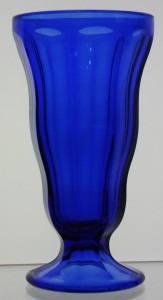
Anchor Hocking Glass Corporation was formed in 1937, a result of the merger of the Hocking Glass Company of Lancaster, Ohio (which began in 1905) and the Anchor Cap and Closure Corporation, Salem, New Jersey (dating from 1913).
Over the years, a number of glass manufacturing plants in the US were involved including locations at Salem, New Jersey; Winchester, Indiana (former Woodbury Glass Company, later, Turner Glass Corp., later General Glass Corp. plant); Connellsville, Pennsylvania (former Capstan Glass Company facility which closed down on November 5 , 2004- thanks to info provided by Tamara Garza) ; Jacksonville, Florida; San Leandro, California; Los Angeles, CA; Waukegan, Illinois and Houston, Texas.
In 1970, the former Phoenix Glass Company plant located in Monaca, Pennsylvania was acquired by Anchor Hocking. That facility is currently (2020) primarily used for producing wine and spirits bottles.
In March of 2023, a former Corning Glass Works plant (originally, Macbeth Evans Glass Company, dating from 1893) in Charleroi, PA was acquired by Anchor Hocking. The plant had been through multiple owners including Corning Glass, World Kitchen LLC and Corelle Brands.
In September of 2024, Anchor Hocking announced plans to move glass-making operations from Charleroi to the main plant at Lancaster, Ohio and close down the Charleroi plant, causing the loss of about 325 jobs.
Charleroi PA glass plant closing – article on Pittsburgh Post-Gazette website
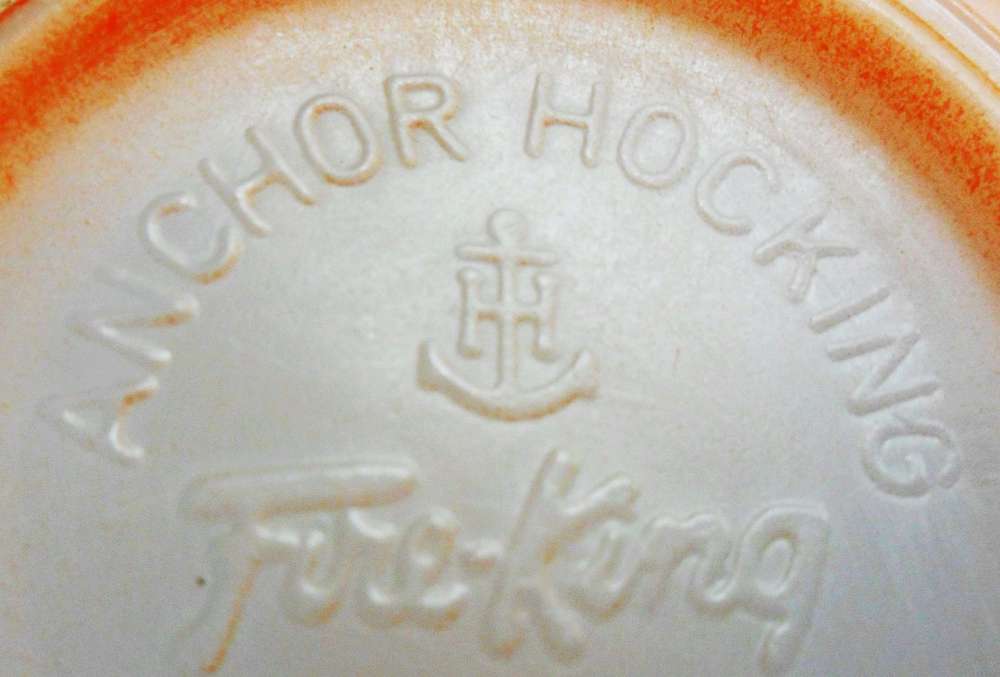
ADVERTISEMENT
Anchor Hocking Glass Corporation became “Anchor Hocking Corporation” in 1969. The word “Glass” was eliminated from the official company name as they were expanding worldwide and diversifying into the production of many other types of products. Later the name was changed again slightly to just “Anchor Hocking Company”.
In recent years it has been known as “Anchor Hocking, LLC”. Over the years the company has went through a number of corporate or private equity firm owners, and currently [2024] Anchor Hocking is a company under the umbrella of Centre Lane Partners, a private investment firm.
Over the decades, Anchor Hocking has produced tremendous quantities of both utilitarian container glass (soda bottles, liquor and other beverage bottles, food containers and bottles for many other types of products) and a great variety of glass tableware and cookware for home use (including such popular product lines as “Ruby Red“, “Forest Green” and their “Fire-King” semi-opaque glassware featuring many “fired-on” surface colors).
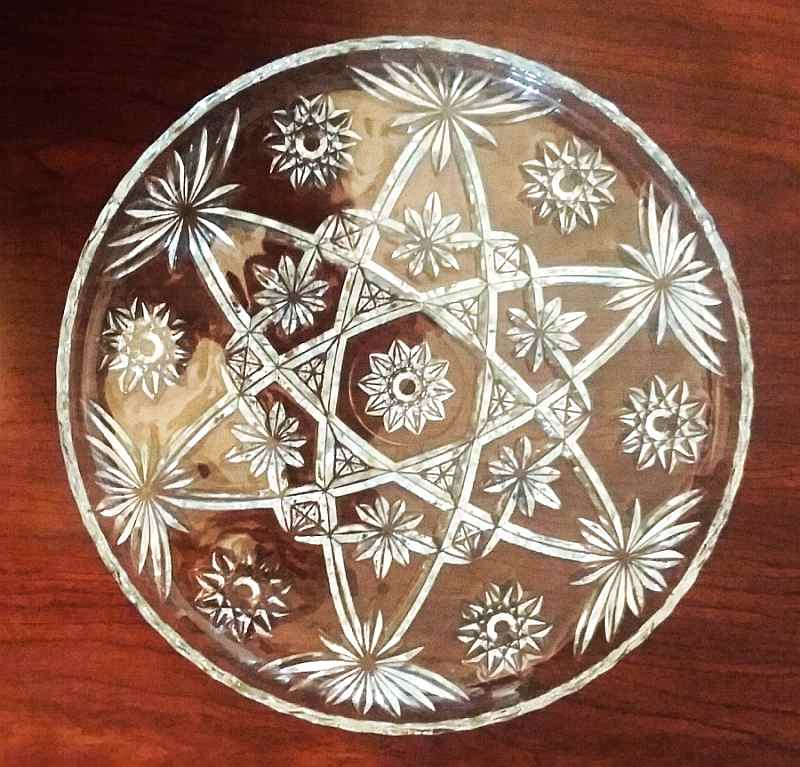
EAPC One of their most popular patterns (probably the most commonly seen pattern made by Anchor Hocking), although not always known by it’s “proper” pattern name or recognized to be a product of this company, is the “EARLY AMERICAN PRESCUT” pattern, often known as EAPC . It is often listed as “Star of David”, at least on some of the larger pieces such as plates and platters. It was made for nearly 40 years, in a very wide range of shapes (pieces), from 1960 to 1999. Most, if not all, of this glassware is not marked. Especially common are the sugar bowls, cream pitchers, relish/pickle dishes, serving bowls of various diameters, punch cups and dessert bowls. The pattern is often seen for sale at garage sales, flea markets and antique malls. Most items were made in clear (crystal) glass, although a few pieces are seen in colors. For a quick look at this pattern, here is a keyword search on Google Images:
Early American PresCut ~ Anchor Hocking Glass Item Search on Ebay
Anchor Hocking produced much so-called “Depression Glass” during the late 1930s into the early 1940s, including green transparent kitchen ware and other glassware.
In 1946, the trademark “Anchorglass” (one word) was registered (claimed first use was in 1945). and – evidently – virtually all of the glassware with this mark bore foil labels instead of having the mark actually embossed into the glass surface. The ware seen with these labels include the popular Forest Green and Royal Ruby lines. They also manufactured quantities of Ruby Red beer bottles and these did carry the embossed mark “Anchorglass” on the base. I’m not sure how long this trademark was actually used on Anchor Hocking’s glassware lines, but I am assuming at least into the 1950s or beyond. Illustrated here is a yellow glass square, shallow bowl with the original red and black label stick affixed.
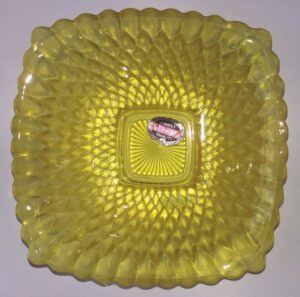
Currently (2024) such items as storage canisters, jars, bottles, coffee mugs, candle holders, tumblers, tea glasses, and other assorted drinkware, cookware and barware articles are still being made here in the United States. Most of the ware made in the US is produced at their glass manufacturing facilities located at Lancaster, Ohio and Monaca, Pennsylvania. However, I was told (in 2014) that some (not all) of the glass marketed by Anchor Hocking has been “outsourced”, in recent years , i.e., is now being manufactured in factories outside the United States.
ADVERTISEMENT
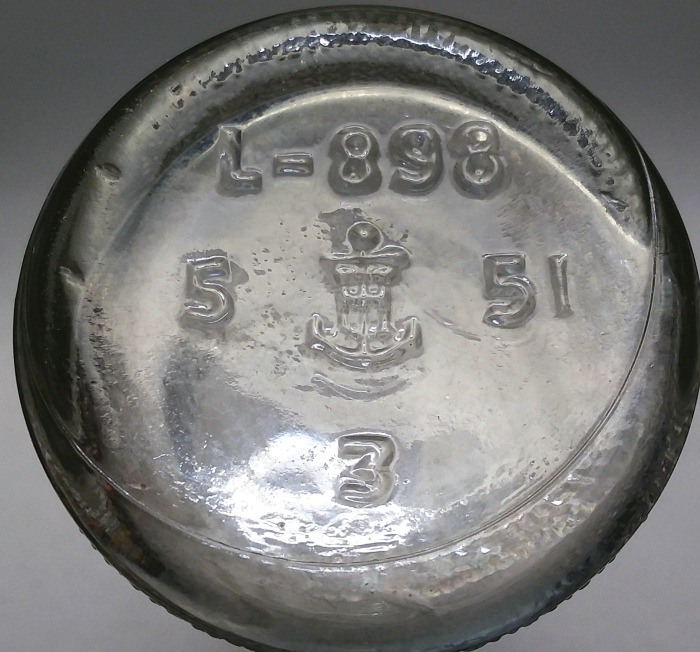
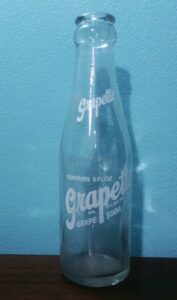
The first identification mark used by the Anchor Hocking Glass Corporation was an “Anchor superimposed over an H” or “Anchor and letter H entwined” which has been in use since 1938. Sometimes the mark is very indistinct with a poor “strike” and might be mistaken for some type of crude “stick figure”, especially on smaller bottles. This trademark was registered/issued on April 9, 1940 by the U.S. Patent & Trademark Office, and first use was claimed to be on June 1, 1938.
The “Anchor superimposed over an H” mark has been used for many years and is still seen, with some minor variation, on much of the glass made by Anchor Hocking. A re-drawn version has been in use in recent years, although it is listed as a “new” trademark and under a different registration number. The revised rendition of their “H superimposed over an Anchor” mark was registered on November 13, 2018, under trademark #5607824.
“Anchor inside a rectangle” or “Boxed Anchor” trademark. This was evidently the second principal “Anchor logo” trademark used widely on Anchor Hocking glassware. According to the Corporation Wiki website, several trademarks which appear to be virtually identical to that one are listed there (under separate trademarks for several different classes of products) and all were said to have been in use since 1977, the last one expiring in 2000. The exact trademark registered to be used on their glassware (under Trademark U.S. Class 021) was registered on July 17, 1979 and “first use” is shown as September 14, 1977. The trademark registration number is 1122404. That specific trademark is listed as officially “expired” on July 3, 2000. Whether this mark was actually embossed on glass between 2000 and 2009 seems open to question…the next major mark change apparently did not come about until 2009 (see next paragraph).
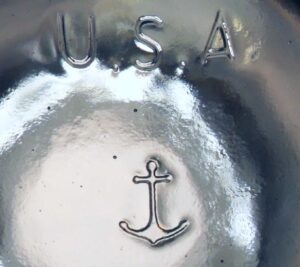
Much of their recent glassware is marked with just an anchor in which no letter H is visible (see photo at left). This is a different, although very similar, trademark which was registered on July 13, 2010, and bears the registration number 3817905. The application was filed with the U.S. Patent & Trademark Office on December 1, 2009. The “first use in commerce” of this trademark is listed as March 16, 2009, according to information on Justia.com, at this page:
Anchor Hocking Trademark – Justia Website
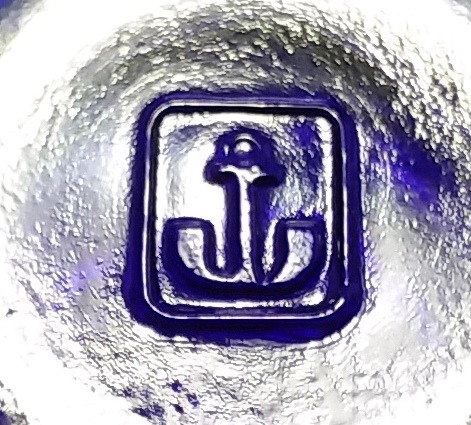
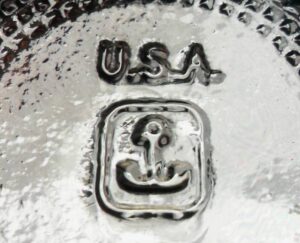
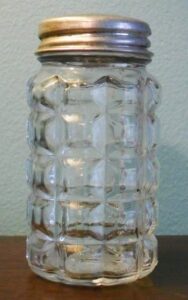
Anchor Hocking was acquired by Monomoy Capital Partners in 2007, and in 2011 MCP acquired Oneida. Both companies were integrated by Monomoy in 2012, and in 2017 they officially became “The Oneida Group”, parent company to Anchor Hocking. The Oneida Group business headquarters are based in Lancaster, Ohio.
ANCHOR GLASS CONTAINER CORPORATION
Most of the original Anchor Hocking Corporation glass container factories then operating were “spun off” in 1983 to form the newly created Anchor Glass Container Corporation, with headquarters in Tampa, Florida. A very wide variety of glass containers for many types of foods, beverages and other products were produced. AGCC filed for bankruptcy in 2011.
Their “stylized anchor” trademark logo which consists of two angular letter Gs oriented back to back (or “mirrored” ) was registered with the U.S. Patent and Trademark Office on February 19, 1985. The registration number for this trademark is 1320769. “First use in commerce” was on September 20, 1983, according to information published on justia.com. https://trademarks.justia.com/734/50/g-73450520.html
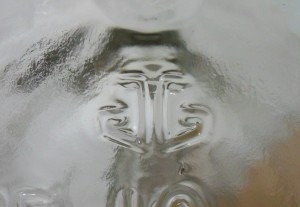
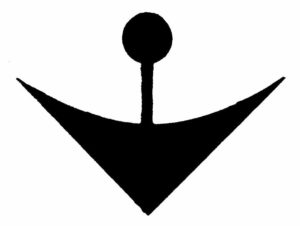
ADVERTISEMENT
In August, 2012 AGCC was acquired by the Ardagh Group, headquartered in Luxembourg, Europe. However, 6 of those Anchor Glass Container Corporation plants were sold by Ardagh Group to KPS Capital Partners in April of 2014. KPS then sold them to CVC Capital Partners and B A Glass in late 2016. Those six bottle plants are located at: Elmira, New York (former Thatcher Glass plant); Warner Robbins, Georgia; Jacksonville, Florida; Lawrenceburg, Indiana; Henryetta, Oklahoma and Shakopee, Minnesota, with company headquarters still based in Tampa, Florida. They continue to produce large quantities of bottles as of 2021. The Anchor Glass Container website is here: Anchor Glass Container Corporation.
For a list of Anchor Hocking plant code numbers and other info pertaining to bottle bases in use during the 1960s/1970s period (courtesy of Dick Cole, fruitjar.org) please see this page: Fruitjar.org – Anchor Hocking Glass Factory Codes.
For some more info, please check these article links (from beveragedaily.com) :
Ardagh Group to sell six Glass Plants
KPS to buy Anchor Glass from Ardagh Group
For more extensive information on the history and glass products of Anchor Hocking, and photos showing some of the rare and unusual glass they made, please check out the Anchor Hocking Museum site at this URL: Anchor Hocking Museum
For much more detailed background information on Anchor Hocking, please check out this web article written by author/researcher Bill Lockhart with input from other researchers: https://sha.org/bottle/pdffiles/AnchorHocking.pdf
The Anchor Hocking website (current as of March 2025) is at this link: https://www.anchorhocking.com/
COLLECTORS WEEKLY webpage on Anchor Hocking, with links to current ebay auctions:
Collectors Weekly: Anchor Hocking
For an extensive list (in alphabetical order) of glass manufacturers’ marks as seen on bottles, fruit jars, insulators, tableware and other items, please click here:
Please click here to go to my website WELCOME/ HOME PAGE.
ADVERTISEMENT
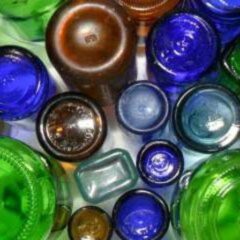

I have an amber coors bottle with the original H over anchor at the bottom when looking at the bottom. 10 on the left edge 68 at the top and 67 on the right. So does that put it at 1967?
Chase, I think it likely does date from 1967. In many cases the date code is positioned to the right of the glassmaker logo. Not always, but usually this is the case on the bottom of soda and beer bottles.
~David
I found a Grapette bottle dated 3/42 and what’s so cool it has 15 flat spaces around the bottom half of the bottle
Hello David ,Great site, one last question spent hours searching, clear screw top 7 in tall, ketchup shaped, 3 ribs on top 3 ribs around heel. Bottom 3 and 1. Helen Harrison center, Anchor Hocking symbol underneath Only thing i found was Helen Harrison was candy maker in Chicago 1940s no pics of bottles only tins any thoughts Thanks
Kevin, I have no idea on the “Helen Harrison” marked bottle. I’m not familiar with it. Maybe a reader will have more information!
Take care, David
I have found an anchor hocking glass apple basket with metal/wood handle. Just trying to find out when it was made. It has the anchor mark as well as USA on the bottom
Hi, I found eight textured, patterned clear juice glasses (3 inches high) with the Anchor Hocking brand (pre-1970’s brand with anchor and H symbol). Your site helped me figure out that they are likely Anchor Hocking because of the branding on the bottom – but after 10 hours of looking on the internet, I can not find the glass pattern anywhere. I bought them second hand thinking they were 1960-70’s Scandinavian glass. They are made of fine thin glass and have a very unusual pattern in the glass reminiscent of the Finnish designer Tapio Wirkkala’s iittala designs (clear hills with sort of pressed snow/ice around). Also when one holds them your realize they are octagonal in nature (although it is very subtle). They are not the Milano Lido pattern I see on line but a bit reminicent of that design. On the bottom it has the Anchor Hocking symbol and USA imprinted. I wonder if anyone has seen them and know if they are old or new? I would be happy to send pictures if anyone is willing to help me identify them.
I welcome any leads.
Thanks, Ruth
sruth.44@gmail.com
Hi Ruth,
I am not familiar with the pattern, but I’m happy to post your query here. Perhaps someone with more knowledge of the many patterns Anchor Hocking made can comment further. In the interest of security and privacy, I don’t normally re-post email addresses supplied by posters, but in this case I am including it for you, in case someone wants to contact you directly. If you wish, you can also send me pics of the glasses to my email, listed at the bottom right-hand corner of the page.
Best regards, David
David, I found a 1/2 gallon jug in an area that was farmed from 1750’s to mid 20th century. It has one half gallon written out at top the bottom has “Anchor H” symbol in the middle to the left is a 6 to the right is a 20 above symbol is 51-86. I thought it was a 1920 jug at first but the symbol is from 1937. Any ideas? Thanks, Joe
Joe, there are various ways in which the Anchor-Hocking jars were marked, and I am not conversant with what all the markings mean on some examples. Sometimes a container carried a date code, but it seems apparent that some did not. I can only say your jar dates from sometime in the late 1930s into the 1940s, 1950s or possibly 1960s.
David
Thanks David, Most of the online images have it looking identical to a 1940’s 1/2 gallon jug style. I’m sure it is vintage & it looks good with my collection.
Hi David…Just acquired a anchor-hocking 1 qt canning jar with a bail top and the word ” LIGHTNING” across the front…Any info on it? Bottom numbers are 6 6 43…Would appreciate any info you might have Thanks Sally
Sally, I don’t know anything about that particular jar. I am guessing (repeat: guessing!) the “43” might be a date code for 1943 but I can’t be sure.
David
I have been searching for the plant number, if I am reading these in the correct order, I cannot translate, although it has been fun and interesting to do so. Ms. Hocking, I found an article that is worth the read on Anchor Hocking, it cleared up more details but I am still on a mission to identify WHERE this piece was made. Anyway, hope you find this as interesting has I did. https://sha.org/bottle/pdffiles/AnchorHocking.pdf
Samantha, I also added a link to that article in my text on Anchor Hocking. Thanks for your post!
David
We found a creamer with the Ancor Hocking logo on it and the number 16 at the bottom but can’t seem to find what that means. Can you tell us.
Crystal, the “16” is a mold number. Please see my webpage about numbers on the bases of bottles and jars.
Take care,
David
Hi David. Great site! I think I found what I’m looking for through your detailed research. It would appear I found some sea glass with the Anchor in the rectangle. A number on the left reads ’18.’ The number on the right reads ’85’ and it appears towards the bottom it might look like a ’70…’ Any ideas as to what it could be? I’m thinking from 1985, some bottle made in Houston TX (the plant number 18). Makes sense seeing as how I found it near Galveston TX.
Brian, you are probably correct. Since Anchor has made huge numbers of bottles of many different designs, I would not know what type of bottle it might be from. Typically, the number to the immediate right of the logo is a date code, so 1985 would be right.
Best regards,
David
My husband inherited some glassware from his grandfather’s kitchen in PA in the early 70s. We just got more from his mother’s farm in Michigan and I found the Anchor Hocking mark on the bottom of juice glasses with flowers etched on them. Are these worth something or okay to use for everyday or give to Goodwill without fear of losing an antique? Are glasses from the 20’s and 30’s that have no mark considered worthless? Thanks for help identifying these glasses. I know nothing about antiques! Just wanting to not give away valuables unknowingly.
Marianne,
My site is not intended as an appraisal service. Please try searching ebay with the COMPLETED AUCTIONS option, using keywords to find similar items. Most unmarked glasses (tumblers, jelly glasses and soft cheese glasses) from the 1920s and 1930s and later (if they are CLEAR glass with no designs on them) have little value other than their solid practical value for ordinary household use. Any glasses with graphics, designs or identifiable patterns DO have value, although the more common types would have mostly lower values. I am not conversant with the relative commonality and current market values on the many, many floral designs found on those types of glasses. Many of those types of glasses were made by Libbey, Hazel-Atlas and other glass makers.
Best regards,
David
I’ve found a glass bottle with 8904 on top 59 on right 39 on bottom and 6 on left. Of course the Anchor and H in the middle. I work construction so I often come across old bottles and have a nice collection going on. i enjoy finding all the information I can and keep it with them.
Thank you Kristy! I assume the bottle was made in 1959 and the “8904” is the mold design number.
Best regards,
David
I found a 2.5 oz Anchor Hocking bottle that has L-875 above the makers stamp, a 5 to the left of it and a ten to the right. I’m curious to know more because it has a cork with a steel piece in the middle tuning down into the bottle with like a cotton ball on the end, basically exactly like the lid on a can of pipe glue just old, it still contains some of the blue liquid inside of it, I am curious to know what is in it or what it was used for
Seth, I don’t know, but it sounds like it might be a glue or mucilage bottle. Or maybe some kind of cleaning product.
David
I think you are right, I’ve looked online and found just bottle that look very similar to the one that I have, the were advertised as medicine bottles, I was thinking maybe some type of antiseptic like what they use before you get a shot or some type of industrial use/liquid. I was just curious if it would be worth more to sell or to keep in my collection because I have not found a single one like it online or in my searches so far
Seth, my site is not intended as an appraisal service but I honestly have no idea on value. I suspect that whatever it is, we would find similar items on the internet via google, ebay, etc if we only knew the ‘right’ keywords to use!
Best regards,
David
Sorry, it would not allow more writing. So my questions about my Christmas tree bottle are….what was MAYBE in this bottle? What kind of closure might it have had, as there are no screw on lines? And could it have once sat in or on some kind of apparatus? And could it have been part of a gift set or a gift to their employees?, as it is somewhat signed by Anchor Glass Container?
Thank you so much for any information!
Karen, I’m not familiar with the bottle and don’t have info on it.
Best regards, David
Thanks anyway David! But my comment will stay posted for other to comment on, should they be farmiliar with it?
Hi Karen,
Yes, it will be here! Thank you and take care!
David
I have a green glass Christmas tree 4″ tall x 2 1/2″ wide. It says…Happy Holidays and Anchor Glass Container…… on it. The words are placed around the tree like garland. And at the bottom of the tree the glass is inset, almost as if it once sat in something else. But around the inset bottom edges it’s got six marks, all are GG but of course they are back to back G’s, they kinda look like an anchor. And on the actual bottom of the bottle it says…Christmas 1987.
Thank you so much for your reply! I’m trying to do the search on Ebay and can’t find the subject and heading boxes you mentioned to check. I also can’t find how to do a saved search. Thank you for your help with this! Such an exciting find!
Hi Kathy,
I think you may need to “Sign in” (be a member of ebay) to take advantage of that function. You definitely need to have a valid, current email address registered with ebay so you can receive the automatic emails.
First, go to any ebay page, although I prefer the “ADVANCED SEARCH” page — just click on the word “ADVANCED” in the top right-hand corner of the page.
On the ADVANCED page, Enter your search keywords in the “ENTER KEYWORDS OR ITEM NUMBER” box, and check the “TITLE AND DESCRIPTION” box which is located under the words “SEARCH INCLUDING”.
Click the SEARCH button. When the next page comes up, look for the “FOLLOW THIS SEARCH” in green lettering. Click that, and it should automatically sign you up for email alerts.
I hope this helps.
~David
Hi! I just found a glass bottom or something with the A under the H- with the numbers 5258 and a 7 underneath. Very nice piece of beach glass- well cooked. Any idea what it’s from?
Thanks!
Kathy
Kathy, you found a base shard of a container made by Hazel-Atlas Glass Company (not Anchor-Hocking), but I can’t say what it was from, since Hazel-Atlas made thousands of different bottles and jars over their long time in business. The “5258” would be the stock/style/inventory number assigned to that particular container. Here’s an idea: try searching ebay periodically with the keywords “(bottle,jar,jug,glass) 5258 ” (with no quotes, and both subject heading and description boxes checked) or institute a “saved search” in which you receive automated emails when possible matches come up. Sooner or later, if a similar bottle is posted on ebay (and the seller includes the embossed markings on the base in their written description) you may see what type of item the shard is from. Ebay can be useful in searches for info such as this, since huge numbers of bottles of every age and description are posted on that site every year. Hope this helps,
David
HI,
I have 4 inch tall pink depression juice glasses and each has only a number on the bottom, number 3 and number 6. what might this mean? thanks
Dorothy
Dorothy, they are mold numbers. Please see my webpage on numbers on the base of bottles.
Best regards,
David
Can someone who knows about these email me at jeramyahross@gmail.com please? I think i found a 1951 bottle but i can’t find very much info online
I found a piece of broken glass with the logo and its red glass and it was found on the rock piles within the low dried up maumee river by side cut park.
Hi Nicole,
You probably found a piece of one of the “Ruby Red” beer bottles that Anchor Hocking made in the 1950s.
David
I am looking for the old Anchor Hocking glass bottling company that was near Vernon California in the early to mid 1970’s.. They sold out to another company about 1976. I used to work for them. Looking to find out what company they sold to.
I live on the Patuxent River and found an old what looks like peanut butter bottle but it has ounce numbers on the side of it Girling only up to 32…. and on the bottom there is a six and on the right there is a 14 with a line underneath of it and then you have an anchor with the H in the middle !!! My email is mattshutz78@gmail.com.. I also as a child found a lot of Washington dairy milk glass bottles that are not broke !! I have always been interested in these bottles please somebody let me know what I have thank you !!! Sincerely Matt S
Hi Matt,
I tried contacting you directly by email but your email was returned with a “mailer daemon” as “unknown”, so perhaps you typed it incorrectly. You can email me pics of the jar, using the email address as shown on the bottom right-hand corner of any page on this site.
Also, there have been thousands of dairies that operated throughout the United States that had personalized glass milk bottles manufactured for them……. many of them carry a company name along with city, town and/or state information. Not sure if you mean “Washington state” bottles or Washington, D.C., but I would suggest you post a query (along with photos of the milk bottles if possible) at the http://www.antique-bottles.net site, where many bottle and jar collectors discuss all types of antique glass containers. There are lots of dedicated milk bottle collectors who frequent that forum, so perhaps someone can pass along better information for you. You just need to sign up as a member in order to post. It is a free and friendly site!
Best regards,
David
Kenneth, Anchor Hocking sold out to Latchford Glass (Latchford home plant Huntington Park) 1976. Latchford Glass sold to Kerr Glass in or around 1980. The Maywood Glass plant shut down around 2003. The plant was torn down 2004 to make room for Air Liquide.